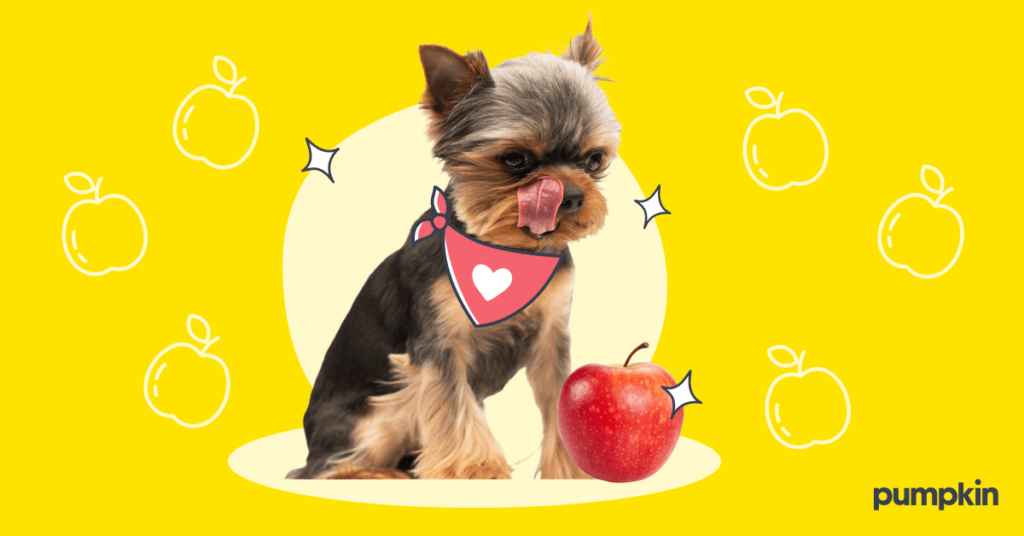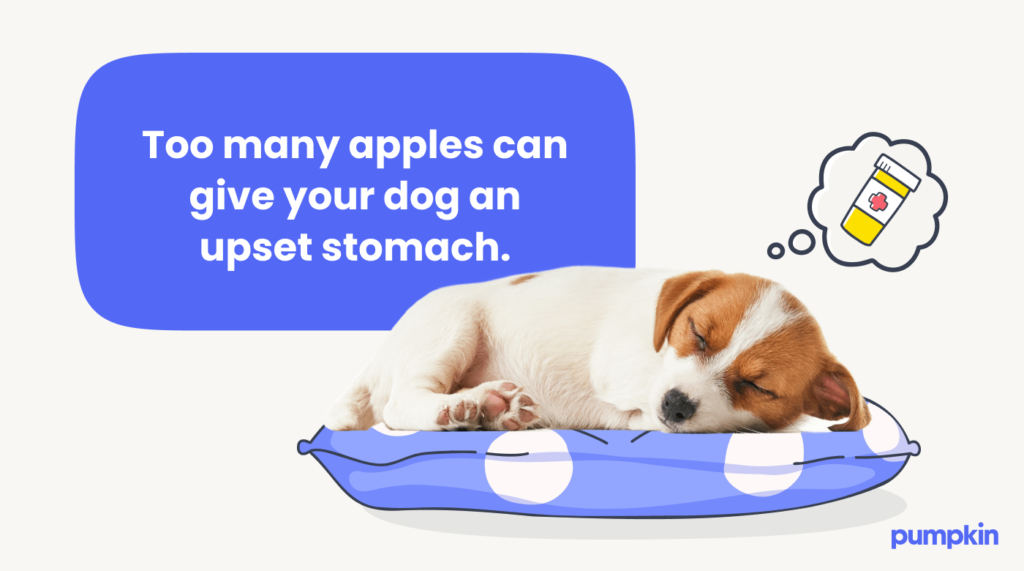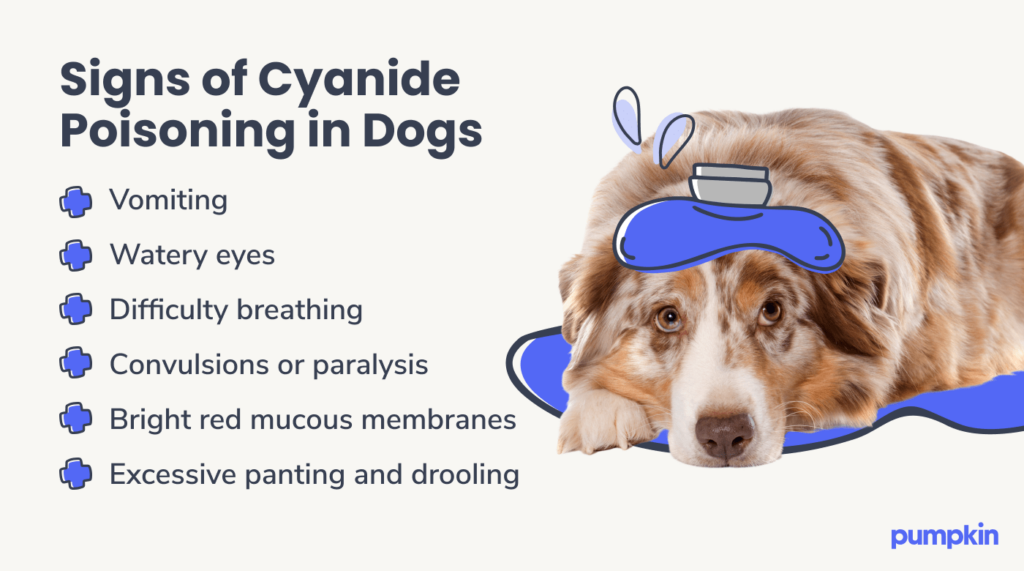Key Points
- Yes, dogs can eat apples, but the core and seeds should be removed.
- Apples provide dogs with vitamin A, vitamin C, and fiber.
- Too many apples can cause upset stomachs in dogs due to the high sugar and fiber content.
That adage “an apple a day keeps the doctor away” is relevant to humans, but what about pets? Can you pass your pooch a slice of your Granny Smith when she gives you that “how dare you not share your food with me, your very best friend?” look?
If you’re holding back because you don’t know if an apple a day will keep the vet away too (and we’re being figurative, not literal — apples aren’t a miracle fruit), then you can relax. Apples are a nutritious and tasty treat for most dogs.
Of course, there are exceptions, and apples may not be a smart snack based on your dog’s age, size, and health conditions. Whenever pup parents wonder if they can give a certain food to their dogs, Pumpkin is here to help. If you have any questions about apples and dogs, keep reading to learn about the benefits, risks, and preparation tips.
So, apples are safe for dogs to eat?
Yes, apples are low-calorie treats high in dietary fiber, chock-full of vitamins C, A, and K, and packed with essential minerals. Apples are also nature’s toothbrush, giving your pup cleaner teeth and fresher breath. (Keep in mind that apples don’t and shouldn’t replace routine doggy dental care.)
Apples should only be given to your dog in moderation. They’re a snack, not a meal replacement, and should be less than 10% of your dog’s daily food intake. If your sneaky snacker overindulges, they risk an upset stomach, diarrhea, or worse.
Some dogs may also be sensitive or allergic to the fruit, so make sure you monitor them the first time they try an apple piece. If your dog has a bad reaction, call your vet for advice.
Are apples safe for puppies to eat?
Puppies have unique dietary needs, so your focus should be on giving them a balanced diet with all the nutrients they need to grow.
Where do apples fit in? A single slice probably won’t harm your puppy. However, we recommend you wait until your pup is regularly eating solid food before offering it.

Remember, until your dog turns a year old, they need a special puppy diet. Your veterinarian will always give you the best nutritional advice for your dog’s needs.
How much apple can my dog eat per day?
The ideal amount to give your dog will vary based on their size, age, and health. A couple of apple slices per day is the recommended portion size and provides sufficient nutrients to supplement dog food. Follow these basic portion guidelines:
- Extra-small dog: one to two bite-sized pieces
- Small dog: two to three bite-sized pieces
- Medium dog: five to six bite-sized pieces
- Large dog to extra-large dog: small handful of slices
If your dog has never had an apple before, start with a small piece to make sure they can digest it without problems. It’s always a good idea to consult your veterinarian with questions about portion sizes.
Nutritional benefits of apples for dogs
Just like humans, dogs need a diet packed with vitamins and minerals to boost their immune system, assist in cell growth and development, and keep their organs in tip-top shape.
Eating apples gives your pup the following vitamins and minerals:
- Vitamin C: A powerful antioxidant that reduces inflammation and supports your dog’s immune system.
- Vitamin A: This vitamin supports growth, cell function, vision, and the immune system.
- Vitamin K: This vitamin supports the blood’s ability to clot.
- Calcium: This powerhouse mineral builds healthy bones and teeth.
- Potassium: This important macro-mineral supports your dog’s kidneys, heart, muscles, and digestive system.
- Fiber: Apples contain pectin, a soluble fiber that absorbs water and helps push food through the digestive system.
- Protein and fats: Apples are low in protein and fats.
- Carbohydrates: Carbs are a substantial source of energy.
Apples for dogs: Preparation do’s and don’ts
Crunchy, sweet apple slices are ideal dog treats — and a healthy snack to boot. But keep these preparation tips in mind before serving your pup:
- Do make sure you remove the seeds and core.
- Do cut the slices into bite-sized pieces to reduce the risk of choking and intestinal blockages.
- Do remove the apple skin to aid in digestion, especially for dogs with sensitive stomachs.
- Don’t ever give your dog a whole apple.
- Don’t give your dog too many apple slices per day.
- Don’t give them fruit in place of a meal.

More apple serving ideas for dogs
If you want to get creative, here are some tasty options that add an extra dose of fun and deliciousness to this healthy snack:
- Add plain yogurt to sliced or grated apples.
- Mix apple slices with bananas, watermelon, sweet potatoes, pumpkin, or green beans.
- Serve apples with peanut butter for a protein boost (just be sure the peanut butter doesn’t contain xylitol)
- Frozen apple slices are nutritious chewing treats for teething puppies, but watch for choking hazards.
- In the summer, puree apple, carrot, and water, then freeze the mixture in ice cube trays.
- Mix small pieces of chopped apples into your dog’s food at mealtimes.
Possible risks associated with apples for dogs
While most of the fruit is healthy and safe for your dog, there are some things to watch out for:
Waxes, pesticides, and herbicides: Most store-bought apples have wax added to their surface to maintain their freshness and make them appear shiny. These waxes serve no nutritional value for your pup and should be washed off, along with any pesticides or herbicides that may be present on the apple’s surface. If your budget allows, organic apples are a pesticide-free choice. Likewise, you can remove the peel entirely.
Seeds and cores: The apple core is hard and can pose a choking hazard or intestinal blockage, especially if your dog is small. Meanwhile, the apple seeds contain a small amount of cyanide, a naturally occurring substance that can cause hypoxia (a lack of oxygen delivery to the body). Cyanide is released when the seeds are cracked or chewed and ingested.
Tip: Accidental ingestion of a few seeds probably won’t harm your dog, but cyanide poisoning can also occur when a few seeds are eaten regularly.
Signs of cyanide poisoning include bright red mucous membranes, watery eyes, difficulty breathing, excessive panting, drooling or vomiting, and paralysis or convulsions. If you suspect your dog ate too many apples or is experiencing cyanide poisoning, see a veterinarian immediately.

Allergic reactions. The first time you offer your dog apples, watch for symptoms like coughing, sneezing, swelling, hives, or trouble breathing. While apple allergies are rare, these reactions could indicate an intolerance or food allergy in your dog. If your pup exhibits any of these symptoms after eating an apple, seek veterinary advice right away.
Carbs, sugar, and fiber: We have one more adage for your consideration: “Too much of a good thing.” Carbs turn into sugars in the digestive tract and can be harmful to diabetic and overweight pups. Fiber supports gut health, blood sugar regulation, and healthy bowel movements; however, too much fiber can cause indigestion and diarrhea in dogs. Lastly, excess sugar can cause weight gain and tooth decay.
The verdict: Apples are a dog-safe snack
When prepared properly and served in moderation, apple slices help keep your dog happy and healthy — so feel free to reward your pup with an apple slice from time to time.
Remember, it’s important to understand the health benefits and hazards of fruits and veggies before sharing them with your pooch. Human foods aren’t always safe for dogs, so you have to stay informed about what your pup can and can’t eat.
Tip: Before making changes to your dog’s diet, it’s always a good idea to consult with your veterinarian for personalized advice. Pumpkin Dog Insurance plans can help cover eligible vet bills — so you can get the best care for the best price.
FAQs about dogs and apples
- American Kennel Club (2024, March 26). Can dogs eat apples? https://www.akc.org/expert-advice/nutrition/can-dogs-eat-apples/
- Merck Manual (2020, October). Cyanide poisoning. https://www.merckvetmanual.com/special-pet-topics/poisoning/cyanide-poisoning
- Verywell Health (2023, August 31). Apple pectin: A source of prebiotics and soluble fiber. https://www.verywellhealth.com/the-benefits-of-apple-pectin-89599
- American Kennel Club (2024, May 28). Puppy feeding fundamentals https://www.akc.org/expert-advice/health/puppy-feeding-fundamentals/
DISCLOSURE




